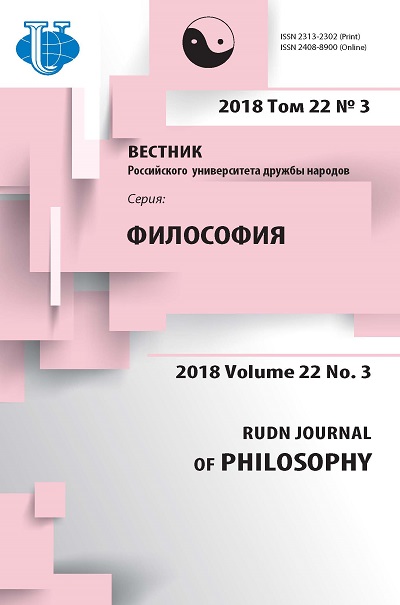SCIENTIFIC AND TECHNOLOGICAL DEVELOPMENT OF MODERN SOCIETY: THE ETHICAL ASPECT
- Authors: Tsvyk VA1, Tsvyk IV2
-
Affiliations:
- Peoples’ Friendship University of Russia (RUDN University)
- Moscow Aviation Institute (National Research University)
- Issue: Vol 22, No 3 (2018)
- Pages: 281-290
- Section: THE PROBLEM OF RESPONSIBILITY IN POST-INDUSTRIAL SOCIETY
- URL: https://journals.rudn.ru/philosophy/article/view/19325
- DOI: https://doi.org/10.22363/2313-2302-2018-22-3-281-290
- ID: 19325
Cite item
Full Text
Abstract
The article analyzes the features of the formation and development of new ethical principles in the conditions of scientific and technological development of modern society. It is noted that the new technological realities of human existence require appropriate reflection in ethical concepts, introducing certain changes in them, the degree of novelty of which allows us to talk about the formation of a new ethics of the scientific, technological and information society. Scientific and technological development is understood as qualitative changes in the technological balance of the economy, leading to economic growth, through the development of science, the creation and use of advanced technologies. These processes need a moral assessment, since from the beginning of the industrial and, subsequently, information revolution, science, technology and new technologies brought not only a positive but also a serious negative contribution to the social and economic process. In the course of this assessment, it is necessary to resolve the contradiction between the need to realize the creative element of a person expressed in the creation of technology and the preservation of the humanistic orientation of scientific and technological development. By directing scientific and technical progress to ethical imperatives and the goals of sustainable development, mankind will be able to turn technology and technologies from morally neutral into value-weighted ones, thereby providing the future generation with the necessary moral imperatives for the humanization of science and technology. Scientific and technological activity is aimed at the development of mankind, has as its goal the good of man, therefore it is humane in nature, and its ethical principles are largely determined by an understanding of the foundations of humanism. For the modern, and even more for the future of the world scientific community, the further development of the tendency for the humanization of science and technology, the ever more complete subordination to the goals of mankind, the combination of research and value approaches, the development of their ethical foundations becomes particularly important.
About the authors
V A Tsvyk
Peoples’ Friendship University of Russia (RUDN University)
Author for correspondence.
Email: tsvyk_va@university.rudn
доктор философских наук, профессор, заведующий кафедрой этики факультета гуманитарных и социальных наук Российского университета дружбы народов
Miklukho-Maklaya Str., 6 Moscow, Russian Federation, 117198I V Tsvyk
Moscow Aviation Institute (National Research University)
Email: tsvykirina@mail.ru
доктор философских наук, профессор кафедры философии Московского авиационного института (национального исследовательского университета).
Volokolamskoe Shosse, 4 Moscow, Russian Federation, 125993References
- Strategy of scientific and technological development of the Russian Federation. Approved by the Decree of the President of the Russian Federation No. 642 of December 1, 2016. URL: http://sntr-rf.ru/ (Accessed 20 February 2018).
- Belyakov GP., Kochemaskin AN. Concept and economic essence of scientific and technological development. Problems of modern economy. 2014;49(1):38-41. (In Russ).
- Dickson D. Science and Technology Communication for Development. URL: https://www.ncbi.nlm.nih.gov/pmc/articles/PMC314483/ (Accessed 3 March 2018).
- Gorokhov VG. The concept of “technology” in the philosophy of technology and the peculiarity of socio-humanitarian technologies. Epistemology and philosophy of science. 2011;28(2):110-123. (In Russ).
- Chetty L-R. The Role of Science and Technology in the Developing World in the 21st Century. [Internet]. URL: https://ieet.org/index.php/IEET2/more/chetty20121003 (Accessed 25 January 2013).
- Vasilyeva AS. Scientific and technical development as a factor of sustainable development and ensuring economic security. Journal of Creative Economy. 2012;(9):3-8. (In Russ).
- Tsvyk AV. Ethics of political responsibility in international relations. RUDN journal of International Relations. 2017;17(2):257-264. (In Russ).
- History and Philosophy of Science (Philosophy of Science). Ed. Kryanev YV., Motorina LE. Moscow: INFRA-M, 2008. P. 416. (In Russ).
- Tsvyk VA. Moral Values of Professional Activity. Personality. Culture. Society. 2014;81-82(1-2):262-268. (In Russ).
- Kapto AS. Professional Ethics. M.- Rostov-on-Don: The Publishing House of the SKAGS, 2006. 800 p. (In Russ).
- Tsvyk IV. Moral Evaluation of Technology. RUDN Journal of Philosophy. 2014;2:145-151. (In Russ).
- Tsvyk VA., Tsvyk IV., Lapshin IE. Ethics of professional practice (Conference proceedings) 3rd International Multidisciplinary Conference on Social Sciences and Arts, SGEM, Atlantis press, 2016. P. 487-494.
- Moiseenko MV., Savvina OV., Mukhametzhanova VS., Kosorukova AA. Code of Ethics as an Instrument for Maintaining Professional Ethics of University Professors (Conference proceedings) 3rd International Multidisciplinary Scientific Conference on Social Sciences & Arts, SGEM, Atlantis press, 2016. P. 403-410.
- Tsvyk VA., Mukhametzhanova VS. Ethical Basis of Professionalism (Conference proceedings) 3rd International Conference on Arts, Design and Contemporary Education, ICADCE. Atlantis press, 2017. P. 741-743.
Supplementary files















